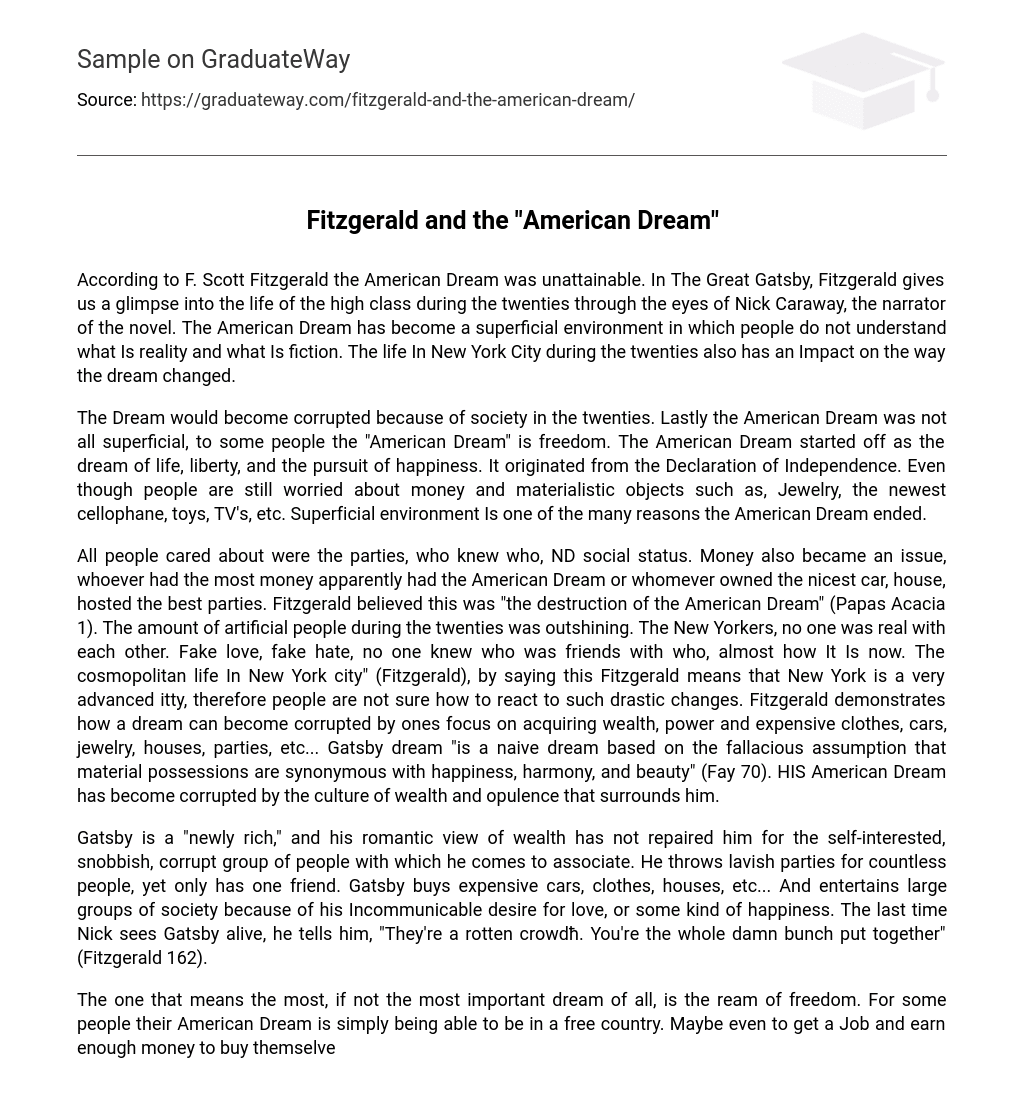F. Scott Fitzgerald believed that achieving the American Dream was unattainable, as depicted in The Great Gatsby through the eyes of Nick Caraway, the narrator. In the 1920s, life among the upper class revealed a superficial existence where distinguishing between reality and illusion became a struggle. Moreover, the influence of New York City during this time greatly shaped the evolution of this dream.
The Dream became corrupted due to society in the 1920s. Furthermore, the American Dream was not solely superficial; for certain individuals, it represented freedom. The American Dream initially emerged as the pursuit of life, liberty, and happiness, stemming from the Declaration of Independence. Despite lingering concerns about money and material possessions like jewelry, the latest gadgets, toys, and televisions, the superficial environment played a significant role in bringing an end to the American Dream.
The only things people were concerned about were parties, knowing the right people, and social status. Money also became an issue – whoever had the most money seemed to have achieved the American Dream, or whoever had the nicest car, house, or hosted the best parties. Fitzgerald believed that this phenomenon was the “destruction of the American Dream” (Papas Acacia 1). The number of fake people during the 1920s was overwhelming. In New York City, no one was genuine with each other. There was fake love, fake hate, and no one knew who was friends with whom – much like it is now. Fitzgerald described New York City as a “cosmopolitan life” (Fitzgerald), meaning that it was a highly advanced city where people were unsure how to react to such drastic changes. Fitzgerald illustrates how a dream can become corrupted when one’s focus is on acquiring wealth, power, and expensive material possessions like clothes, cars, jewelry, houses, and parties. Gatsby’s dream is described as “naive,” as it is based on the false belief that material possessions equate to happiness, harmony, and beauty (Fay 70). His American Dream has been corrupted by the culture of wealth and extravagance that surrounds him.
Gatsby, a newcomer to wealth, holds a romanticized view of riches that does not prepare him for the self-serving, snobbish, and corrupt individuals with whom he becomes associated. Despite hosting extravagant parties for numerous guests, Gatsby only has one true friend. He spends lavishly on cars, clothing, houses, and more, all in the pursuit of love or some form of happiness that he cannot articulate. In their final encounter, Nick tells Gatsby, “They’re a corrupt crowd. You embody all of them combined” (Fitzgerald 162).
The most significant and possibly the most important dream is the dream of freedom. For some individuals, their American Dream is simply residing in a country that values freedom. It could also mean finding employment and earning enough money to purchase desired items, allowing them to proudly say, “Yes, I worked hard for this.” It means finding contentment in their accomplishments or having the ability to resist oppressive foreign control or authoritarian governance. The exploration of the protagonist’s interactions with upper-class society portrays how the American Dream has significantly declined.
Ultimately, the American dream was destroyed by the people themselves, driven by their beliefs and desire for material possessions. While opinions about the American dream may vary, each person has the power to pursue their own dream. The American dream was gradually eroded, in part due to materialistic values. People’s actions and the way they treated others also played a significant role in its demise. Furthermore, corruption further contributed to the downfall of the American dream. Therefore, a combination of these factors led to its corruption.
Despite the destruction that has occurred, the belief in the American dream as a positive concept, such as freedom, still persists today. It may continue to exist for certain individuals, even though Fitzgerald’s belief that it was finished does not apply to everyone else.





